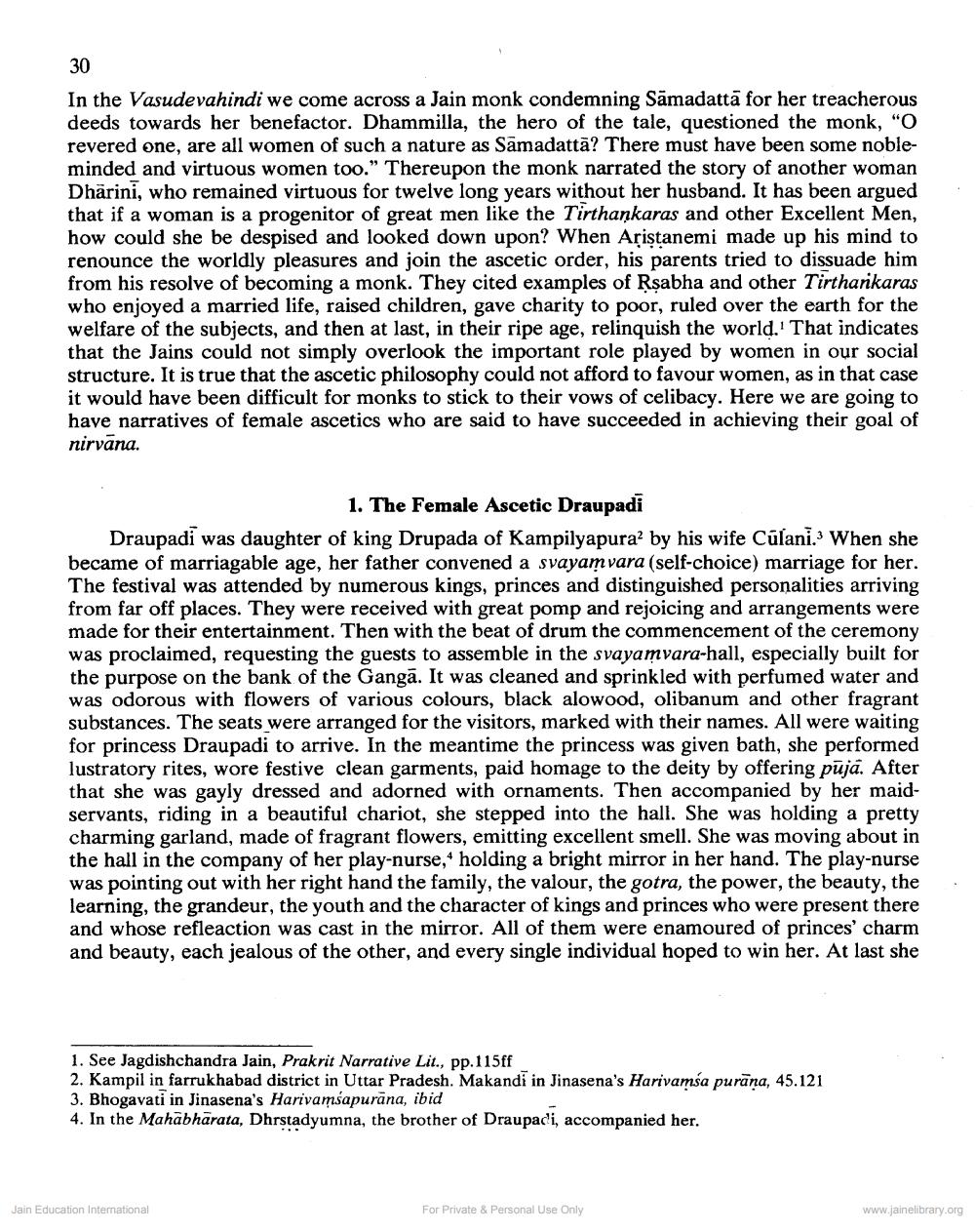________________
30 In the Vasudevahindi we come across a Jain monk condemning Sāmadattā for her treacherous deeds towards her benefactor. Dhammilla, the hero of the tale, questioned the monk, "O revered one, are all women of such a nature as Samadattā? There must have been some nobleminded and virtuous women too." Thereupon the monk narrated the story of another woman Dharini, who remained virtuous for twelve long years without her husband. It has been argued that if a woman is a progenitor of great men like the Tirthankaras and other Excellent Men, how could she be despised and looked down upon? When Aristanemi made up his mind to renounce the worldly pleasures and join the ascetic order, his parents tried to dissuade him from his resolve of becoming a monk. They cited examples of Rsabha and other Tirtharkaras who enjoyed a married life, raised children, gave charity to poor, ruled over the earth for the welfare of the subjects, and then at last, in their ripe age, relinquish the world. That indicates that the Jains could not simply overlook the important role played by women in our social structure. It is true that the ascetic philosophy could not afford to favour women, as in that case it would have been difficult for monks to stick to their vows of celibacy. Here we are going to have narratives of female ascetics who are said to have succeeded in achieving their goal of nirvana.
arried life, fai monk. They ciascetic order, hiristanemi made e
1. The Female Ascetic Draupadi Draupadi was daughter of king Drupada of Kampilyapura? by his wife Cūlani. When she became of marriagable age, her father convened a svayamvara (self-choice) marriage for her. The festival was attended by numerous kings, princes and distinguished personalities arriving from far off places. They were received with great pomp and rejoicing and arrangements were made for their entertainment. Then with the beat of drum the commencement of the ceremony was proclaimed, requesting the guests to assemble in the svayamvara-hall, especially built for the purpose on the bank of the Gangā. It was cleaned and sprinkled with perfumed water and was odorous with flowers of various colours, black alowood, olibanum and other fragrant substances. The seats were arranged for the visitors, marked with their names. All were waiting for princess Draupadi to arrive. In the meantime the princess was given bath, she performed lustratory rites, wore festive clean garments, paid homage to the deity by offering pūjā. After that she was gayly dressed and adorned with ornaments. Then accompanied by her maidservants, riding in a beautiful chariot, she stepped into the hall. She was holding a pretty charming garland, made of fragrant flowers, emitting excellent smell. She was moving about in the hall in the company of her play-nurse, holding a bright mirror in her hand. The play-nurse was pointing out with her right hand the family, the valour, the gotra, the power, the beauty, the learning, the grandeur, the youth and the character of kings and princes who were present there and whose refleaction was cast in the mirror. All of them were enamoured of princes' charm and beauty, each jealous of the other, and every single individual hoped to win her. At last she
1. See Jagdishchandra Jain, Prakrit Narrative Lit., pp. 115ff 2. Kampil in farrukhabad district in Uttar Pradesh. Makandi in Jinasena's Harivamsa purāna, 45.121 3. Bhogavati in Jinasena's Harivamsapurāna, ibid 4. In the Mahabharata, Dhrstadyumna, the brother of Draupadi, accompanied her.
Jain Education International
For Private & Personal Use Only
www.jainelibrary.org




